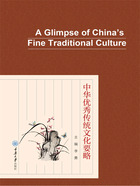
Chapter 1 Confucius: Supreme Sage and Foremost Teacher
Confucius was the first and most famous scholar of the Spring and Autumn Period. As a great thinker, statesman, educator and the founder of Confucianism, Confucius is an ancient sage to the Chinese people, and his thought has for many years exerted a deep influence on China and other countries in East Asia.

Confucius was born into an impoverished aristocratic family at Zouyi (陬邑) in the State of Lu (鲁), in Qufu (曲阜) of the present-day Shangdong Province, in 551 B.C.E. Kong (孔) was his family name; his given name was Qiu (丘) and his literary name Zhongni (仲尼). But he is often referred to by his title of honor, Kong Fuzi (孔夫子), meaning Master Kong. A legend goes that before his birth, his parents had prayed to the god of Mount Niqiu (尼丘山) for a son, so they called him Qiu and Zhongni. Confucius is his Latinized name, which has been widely used in the West ever since he was known abroad.
Confucius was only three years old when his father died. In Qufu, the capital of Lu, the mother and her son had a hard life. Young Confucius was smart and showed a great interest in study, and his mother did everything possible to encourage him. But his mother died when he was 16 or 17 and could not see her son established as a learned scholar.
Later, recalling his earlier days, Confucius said, “At 15 I was determined to study; at 30 I was established; at 40 I was not perplexed; at 50 I knew what destiny was; at 60 I was open to different opinions; at 70 I could do whatever I wanted and would not break any rules. (吾十有五而志于学,三十而立,四十而不惑,五十而知天命,六十而耳顺,七十而从心所欲,不逾矩。)” It appears that he had in his youth studied many classic works and formed his own views about the most important problems of history, society and mankind. The Analects of Confucius (《论语》), a collection of 500 sayings of Confucius and his major disciples, and their comments and answers to questions, is the earliest and most reliable source of the life and teachings of Confucius and is regarded as the basic “scripture” of Confucianism.
In his early twenties, Confucius served as a keeper of the granary and later as a supervisor of flocks in the State of Lu. It is said that he once became the Minister of Justice and the Prime Minister of Lu. For a few years, his work as an official brought about very good results. But those aristocrats who gained real control of the government disliked his measures and made it difficult for him to carry out his ideals. So he, full of disappointment, resigned his position at 55.
During the next 13 years, accompanied by several faithful disciples, Confucius wandered from state to state to preach his theories and seek a position suitable for his talent. When he was 68 years old, he returned home at the invitation of a new generation of nobles who came into power in the State of Lu. In his last years he did not work in the government, but devoted himself to teaching his disciples and editing the six classics. It is said that the six classics compiled by Confucius include The Book of Songs (《诗经》), The Book of History (《书经》), The Book of Rites (《礼经》) , The Book of Changes (《易经》) , The Book of Music (《乐经》) , and The Spring and Autumn Annals (《春秋》) . In 479 B.C.E., when he was 73, he fell ill and passed away.
Confucius received numerous posthumous title, “Supreme Sage and Foremost Teacher (至圣先师)”, “Great Perfect, Most Holy Culture Spreading King (大成至圣文宣王)”, “A Great Sage in the Fateful World, and an Ideal Teacher for Myriads of Years (命世大圣,亿载师表)”, to mention just a few.